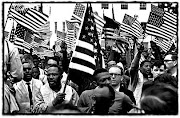 After almost 50 years of his brand of revolution on the island nation of Cuba, President of the Council of State, Fidel Castro, is grabbing his gold watch
After almost 50 years of his brand of revolution on the island nation of Cuba, President of the Council of State, Fidel Castro, is grabbing his gold watch  and exiting the political stage right. No US president from Dwight Eisenhower to George W. Bush made him bow to American pressure. US policy implemented and maintained harsh sanctions that hurt the people of Cuba while cooking up dastardly deeds and stupid assassination plots, to force coup maestro Castro to bend to their will. Soviet and Russian leaders anxious to ensure Castro had the money and tools to withstand American pressure, made him a showpiece client state to spread the virtues of Communism into the Western Hemisphere.
and exiting the political stage right. No US president from Dwight Eisenhower to George W. Bush made him bow to American pressure. US policy implemented and maintained harsh sanctions that hurt the people of Cuba while cooking up dastardly deeds and stupid assassination plots, to force coup maestro Castro to bend to their will. Soviet and Russian leaders anxious to ensure Castro had the money and tools to withstand American pressure, made him a showpiece client state to spread the virtues of Communism into the Western Hemisphere.Caught in the tightening vice between geopolitical realities and starvation, Cuban people were jailed, beaten, executed in a willy-nilly fashion while the more fortunate were stripped of ancestral homes and property under Castro's regime, making escape their number one priority with the twin objectives of saving their lives and shaming Castro. Cuba earned its vile reputation for human rights abuses under Fidel Castro's rusty iron fist. Fidel's assumption of the presidency arose from his bloody coup after his Mexican exile.

Famed for firebrand speeches - often lasting several hours, his straggly beard and the cigars he reluctantly gave up for his health, he was the world’s third longest-serving head of state. Born Fidel Castro Ruz on August 13, 1926, he attended Catholic schools before graduating from the University of Havana with a law degree.
He later ran for a parliamentary seat, but Fulgencio Batista overthrew the government and cancelled the election.
An angry Castro assembled an unsuccessful rebel force, but was captured and sentenced to 15 years in prison. Defending himself at his 1953, Castro delivered one of his most famous speeches. “Condemn me. It does not matter. History will absolve me,” he said.
Pardoned after just two years, he headed to Mexico where he trained a group of revolutionaries called the 26th of July Movement.
Their first invasion of Cuba failed, but Castro’s guerilla war quickly won him many supporters and eventually, on January 1, 1959, Batista fled the island and Castro seized power.
 Last year, Fidel Castro, 81, underwent life threatening surgery for stomach ailments described as cancer, that made him give temporary custody of the Cuban presidency to his 70-something baby brother, Raul. Previously, Castro fainted during one of his excruciatingly long rambling speeches about Cuba's revolution. One of his bedside well wishers was Castro's Venezuelan acolyte Hugo Chavez with his continuing supply of oil and friendship. Meanwhile in Miami, Florida, Little Havana is throwing a party that will be awash in news photographers from around the world. Castros resignation letter uses his grandiose quote - "I will not cling to office", now would have been a good admission addition.
Last year, Fidel Castro, 81, underwent life threatening surgery for stomach ailments described as cancer, that made him give temporary custody of the Cuban presidency to his 70-something baby brother, Raul. Previously, Castro fainted during one of his excruciatingly long rambling speeches about Cuba's revolution. One of his bedside well wishers was Castro's Venezuelan acolyte Hugo Chavez with his continuing supply of oil and friendship. Meanwhile in Miami, Florida, Little Havana is throwing a party that will be awash in news photographers from around the world. Castros resignation letter uses his grandiose quote - "I will not cling to office", now would have been a good admission addition. Fidel's longevity as a bearded political tyrant and head of state, despite coup attempts, the Bay of Pigs, the Soviet nuclear Missile crisis, embargoes trapping the country in the 1950's, the Mariel Boat lift, the deaths of so many attempting to float on capricious and rough waves to America atop the wildest mixes of cardboard, 1950's car parts and patched up innertubes and Elián González, his political antics and dynamics have been sources of deep angst and embarrassments inside the Oval Office. Cuba immigrants have a special plan or entry into the US - "the wet foot, dry foot" policy determining their status.
Fidel's longevity as a bearded political tyrant and head of state, despite coup attempts, the Bay of Pigs, the Soviet nuclear Missile crisis, embargoes trapping the country in the 1950's, the Mariel Boat lift, the deaths of so many attempting to float on capricious and rough waves to America atop the wildest mixes of cardboard, 1950's car parts and patched up innertubes and Elián González, his political antics and dynamics have been sources of deep angst and embarrassments inside the Oval Office. Cuba immigrants have a special plan or entry into the US - "the wet foot, dry foot" policy determining their status. Cuba Confidential: Love and Vengeance in Havana and Miami is an outstanding book that takes a deep look at Cuba in the twentieth century through the eyes of Castro's colorful and fractious family - a few who sit in the US House of Representatives - and its people as told about a seven year old kid washed up on a south Florida Beach starting an international firestorm on custody resulting in a fully armed FBI night raid to return the little boy in his pajamas back to Cuba. All the high drama and reasons are chronicled by the powerful writer, Ann Louise Bardach.
Cuba Confidential: Love and Vengeance in Havana and Miami is an outstanding book that takes a deep look at Cuba in the twentieth century through the eyes of Castro's colorful and fractious family - a few who sit in the US House of Representatives - and its people as told about a seven year old kid washed up on a south Florida Beach starting an international firestorm on custody resulting in a fully armed FBI night raid to return the little boy in his pajamas back to Cuba. All the high drama and reasons are chronicled by the powerful writer, Ann Louise Bardach.










No comments:
Post a Comment